🎗️Lonny's War Update- October 594, 2023 - May 22, 2025 🎗️
Families of hostages demand Israel resume electricity to Gaza, threaten to go to High Court
A number of relatives of hostages send a letter to Prime Minister Benjamin Netanyahu demanding that the government reverse a decision to cut off electricity to the Gaza Strip, saying it endangers their loved ones.
In the letter, also sent to Foreign Minister Gideon Sa’ar and Energy Minister Eli Cohen, the relatives say that the decision puts their loved ones in immediate danger and that a lack of electricity intensifies the spread of diseases in the Strip and worsens the conditions for the hostages.
The letter from the families says that if there is no government response, they will file a petition to the High Court. The letter does not include any specific names of signatories. link We know, with absolute certainty from the returned hostages, that actions like these by the government and army provokes worse treatment of the hostages by their terrorist captors. They are given less food and water or are totally deprived of it, they are tortured, shackled, heads covered, not allowed to go to the bathroom and worse. This is not theoretical. It happened to the hostages every single time that the government applied additional hardships on Gaza, renewed fighting, withdrew negotiators, etc. The government actions have direct horrifying implications for the hostages but this government doesn't care. They have given up on the hostages a very long time ago and their suffering and the suffering of the hostage families doesn't move them at all. They are not worthy of us.
Hostage families warn Israel increasingly at risk of ‘missed opportunity of the century’
The Hostages and Missing Families Forum slams Prime Minister Benjamin Netanyahu over his remarks on the war in Gaza at a press conference, calling on him to immediately reach a deal with Hamas for the return of the remaining captives and end to the war.
“We are heading toward the ‘missed opportunity of the century,’ Those who will pay the price are the people of Israel, the hostages, the evacuees, and tens of thousands of reserve soldiers and their families,” the group says in a statement. “After more than 19 months of war, there is no end in sight; no chance for recovery and rehabilitation on the horizon. The truth is that there can be no national revival without the return of all hostages, down to the very last one.”
“President Trump has put a plan on the table. Prime Minister Netanyahu needs to listen to the will of his entire nation – to sign an agreement that will immediately bring back all hostages and end this war,” the group adds.
Dermer tells ministers White House promised direct Hamas talks ‘won’t happen again
According to a report in the Axios new site, Strategic Affairs Minister Ron Dermer told a security cabinet meeting yesterday that US envoy Adam Boehler’s controversial direct talks with Hamas do not represent the White House position.
An unnamed Israeli official tells the news site that Dermer also said the Trump administration promised Israel that “it won’t happen again,” and that US envoy Steve Witkoff will remain the lead negotiator on the issue of Israeli hostages.
The official says that Witkoff promised Israel he would not hold direct talks with Hamas unless the terror group makes “tangible concessions,” according to the news site.
Meanwhile White House Press Secretary Karoline Leavitt is quoted by Axios as saying that US President Donald Trump “fully backs and supports” Boehler’s talks — contradicting Dermer’s reported comments.
Earlier today, US Secretary of State Marco Rubio said the direct talks were a “one-off” that so far “haven’t borne fruit.” link The only thing that Dermer is good for is for being Netanyahu's lapdog. His only concern is for the political survival of Netanyahu and not for the hostages. Netanyahu put him in charge of the hostage negotiations for one reason, to make sure that Netanyahu's will overrides everything. He has done nothing positive for the hostages and has no issue with sacrificing them on the Altar of Netanyahu.
Towards the end of the 5 year and 4 month captivity of Gilad Schalit by Hamas, David Meidan, a former deputy chief of the Mossad, was appointed by Netanyahu as the Coordinator for missing and captive soldiers. On his first day in that position, my brother contacted him to offer his contacts with Hamas to provide a direct line of communication and negotiations between the Israeli government and Hamas. Meidan verified my brother's connections and then got permission for this direct back channel because he recognized that it held the best chance of bringing Gilad back home. Within 4 months, Gilad was home thanks to my brother's direct back channel with Hamas.
Dermer is quite the opposite. Instead of looking for the ways to best get our hostages home, he does all he can to disrupt any other method than those prescribed by his boss. He is a total failure in this position that he never should have been given in the first place and should be removed immediately to make way for people who are truly concerned for the hostages and not for his boss.- Israel said returning its entire negotiating team from Qatar over deadlock in hostage-ceasefire talks
Prime Minister Benjamin Netanyahu has decided to recall the entire Israeli delegation from Qatar due to the continued impasse in indirect negotiations with Hamas for a ceasefire and hostage deal, multiple Hebrew media outlets report.
On Tuesday, Netanyahu announced that high-level members of the negotiating team were returning after a week of “intensive” hostage talks in Doha, while a number of working-level representatives were remaining in the Qatari capital. link This is hardly a surprise. Netanyahu had no intention of making any deal that would include ending the war and he knows that Hamas won't make any deal that doesn't include ending the war. The only reason he left the junior team in Doha after recalling the seniors was so the Americans wouldn't blame him for throwing in the towel first. Unfortunately, there wasn't any towel to throw in because there was no hope for reaching any agreement based on Netanyahu's limitations given to the negotiators. Disgraceful behavior by the one who should be doing the most to get the hostages home but is actually the one doing the least, and even preventing deals to be made.
Responding to Netanyahu, Hamas rules out exiling its leadership or giving up its weapons
Hamas spokesman Jihad Taha told the Qatari Al Jazeera channel last night, in response to Prime Minister Benjamin Netanyahu’s speech in which he presented a list of preconditions for ending the war, that the terror group will not give up the “weapons of the resistance,” referring to the weapons of Hamas and other terrorist organizations in the Gaza Strip.
He further states that the group refuses to exile its leadership from the Strip, as they are part of the Palestinian people.Gazans say no humanitarian aid has reached them, day after trucks entered Strip
Palestinians line up to receive a hot meal at a food distribution point in the Al-Rimal neighborhood in Gaza City, in the Gaza Strip on May 21, 2025. (Omar AL-QATTAA / AFP)
IDF’s COGAT declines to comment on UN claims that agencies have not been allowed to pick up supplies from border; Israel allows UAE to send assistance to feed 15,000Palestinians and aid agencies in Gaza on Wednesday said they were still waiting for aid to enter the Strip more than 48 hours after Israel, amid mounting international pressure, said it would start sending in desperately needed food and supplies after an 11-week blockade.
The UN has said even though trucks have entered Gaza, the Israeli army has not given permission to pick up the aid on the Gaza side of the border. The IDF body responsible has declined to comment on the charges.
“None of this aid – that is a very limited number of trucks – has reached the Gaza population,” said Antoine Renard, country director of the World Food Program (WFP), who said the trucks appeared to be stopped in Kerem Shalom, the sprawling logistics hub at the south-eastern corner of the Gaza Strip.Abdel-Nasser Al-Ajramy, the head of the Gaza bakery owners’ society, said at least 25 bakeries that were told they would receive flour from the WFP had seen nothing, and the people waiting for food had no relief from hunger.
“There is no flour, no food, no water,” said Sabah Warsh Agha, a 67-year-old woman from the northern Gaza town of Beit Lahiya sheltering in a cluster of tents near the beach in Gaza City. “We used to get water from the pump, now the pump has stopped working. There is no diesel or gas.”
Umm Talal Al-Masri, 53, a displaced Palestinian living in an area of Gaza City, on Wednesday described the situation as “unbearable.”
“No one is distributing anything to us. Everyone is waiting for aid, but we haven’t received anything,” she told AFP.
“We’re grinding lentils and pasta to make some loaves of bread, and we barely manage to prepare one meal a day.”
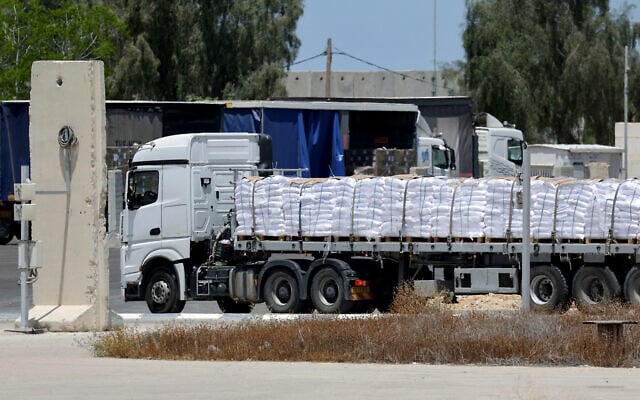 A truck carrying aid enters the Gaza Strip from the Israeli Kerem Shalom crossing, on May 20, 2025. (Jack GUEZ / AFP)
A truck carrying aid enters the Gaza Strip from the Israeli Kerem Shalom crossing, on May 20, 2025. (Jack GUEZ / AFP)The Defense Ministry’s Coordinator of Government Activities in the Territories (COGAT), which coordinates the supply of humanitarian aid into Gaza, on Wednesday declined to respond to claims by the United Nations that its agencies have been unable to collect and distribute aid brought into the territory on Tuesday through the Kerem Shalom goods crossing.
Stéphane Dujarric, a spokesman to the UN Secretary General, said on Tuesday that members of a UN team “waited several hours for Israeli green light to access Kerem Shalom area” to pick up the aid that was brought in, but ultimately they had not been able to do so.
COGAT said Tuesday night that 93 UN trucks carrying “flour for bakeries, food for babies, medical equipment, and pharmaceutical drugs” were “transferred via the Kerem Shalom Crossing into the Gaza Strip.”
Israel had blocked all aid from entering Gaza since March 2, arguing that sufficient humanitarian assistance had entered the Strip during a six-week ceasefire before that and that Hamas was stealing aid, with the blockade necessary to pressure the terror group to release the dozens of hostages it is holding.
In recent weeks, however, some officials in the IDF have begun warning the political leadership that the enclave was on the brink of starvation.
UN agencies and humanitarian organizations have said that “acute hunger” and displacement caused by Israel’s renewed military campaign and “extreme levels of deprivation” in Gaza mean that the civilian population is in desperate need of large volumes of aid to avoid a humanitarian disaster.
Trading blame
Before the ceasefire that went into effect on Jan. 19, COGAT and the UN were in an ongoing dispute about who was responsible for aid distribution difficulties.
The UN claimed that COGAT and the IDF frequently refused their requests for collection and distribution authorization, and that dangerous and complex conditions inside Gaza made aid distribution very difficult.
However, COGAT claimed that the number of times it denied authorization was extremely low, and presented figures to the High Court of Justice to that effect. It also claimed that the UN was inefficient in delivering the aid, and pointed out that large quantities of aid frequently accumulated on the Gazan side of Kerem Shalom.
Aid groups also charge that aid that has been allowed in is massively insufficient.
The amount of aid Israel has started to allow into war-ravaged Gaza Strip is not nearly enough and is “a smokescreen to pretend the siege is over,” the Medecins Sans Frontieres (Doctors Without Borders) aid group said.
“The Israeli authorities’ decision to allow a ridiculously inadequate amount of aid into Gaza after months of an air-tight siege signals their intention to avoid the accusation of starving people in Gaza, while in fact keeping them barely surviving,” says Pascale Coissard, MSF’s emergency coordinator in southern Gaza’s Khan Younis.
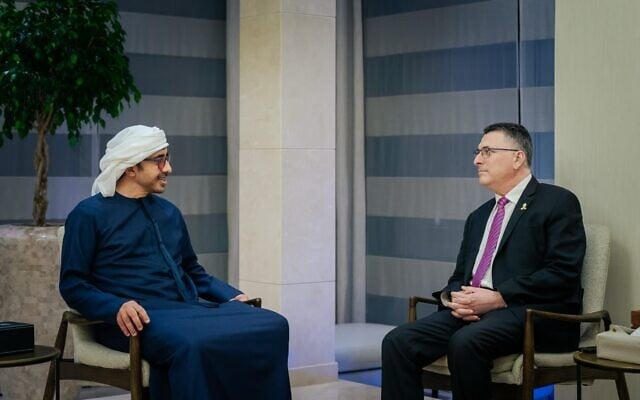 Foreign Minister Gideon Sa’ar (right) meets in Abu Dhabi with his Emirati counterpart Abdullah bin Zayed Al Nahyan on April 6, 2025. (Foreign Ministry)
Foreign Minister Gideon Sa’ar (right) meets in Abu Dhabi with his Emirati counterpart Abdullah bin Zayed Al Nahyan on April 6, 2025. (Foreign Ministry)Meanwhile, Israel agreed to allow humanitarian assistance from the United Arab Emirates into Gaza, which will initially feed 15,000 people, Abu Dhabi announced Tuesday following a phone call between Emirati Foreign Minister Abdullah bin Zayed and his Israeli counterpart, Gideon Sa’ar.
“The initiative also includes the provision of essential supplies to support the operation of bakeries in the Strip, as well as critical items for infant care, while ensuring a continuous supply to meet the ongoing needs of civilians,” said the UAE Foreign Ministry’s director of communications, Afra al-Hameli, in a statement.
Israel has relied heavily on the UAE’s support for humanitarian aid in Gaza. Abu Dhabi says its assistance amounts to over 40% of the aid that enters the Strip.
Earlier this month, Israel sought to convince the UAE to bankroll a new aid initiative led by the newly founded Gaza Humanitarian Foundation. Aid groups have pushed back against the effort, saying it fails to address the humanitarian crisis and forces the mass displacement of Gazans, while failing to feed almost 40 percent of them initially. Emirati officials accordingly told their Israeli counterparts that they could not back the GHF initiative as it currently stood, a source familiar with the matter told The Times of Israel.
The US-backed GHF will start work in Gaza by the end of May under a heavily criticized aid plan that the UN aid chief Tom Fletcher has described as a “fig leaf for further violence and displacement” of Palestinians in Gaza.
During Tuesday’s call between the foreign ministers, bin Zayed “affirmed the importance of ensuring the urgent, sustainable, safe and unhindered delivery of humanitarian, relief, and medical assistance to the brotherly Palestinians in the Strip,” the Emirati readout said, adding that the ministers also discussed efforts to reach a hostage release and ceasefire deal between Israel and Hamas.
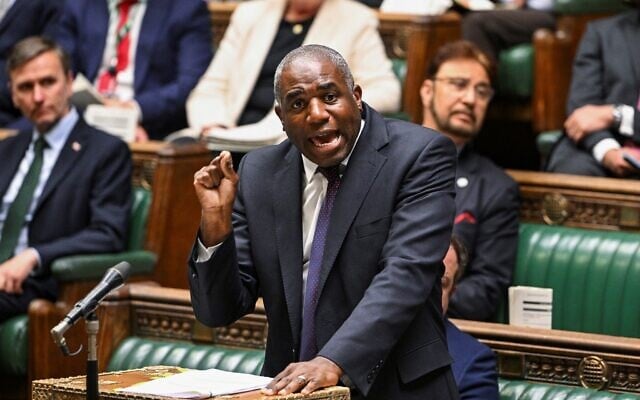 Britain’s Foreign Secretary David Lammy speaks to MPs during a statement on Israel and the war in Gaza in the House of Commons, in London, on May 20, 2025. (House of Commons / AFP)
Britain’s Foreign Secretary David Lammy speaks to MPs during a statement on Israel and the war in Gaza in the House of Commons, in London, on May 20, 2025. (House of Commons / AFP)Amid growing global outrage, the United Kingdom said Tuesday it was suspending free trade agreement negotiations with Israel and taking other punitive measures, including the imposition of sanctions on a list of West Bank settlers, in response to Israel’s wartime policies during its conflict with Hamas in Gaza.
Additionally, the European Union agreed to review its cooperation deal with Jerusalem over alleged human rights abuses in Gaza.
On Monday, the leaders of Britain, France, and Canada issued a joint statement condemning Israel’s handling of the humanitarian situation in Gaza and calling on Israel to immediately halt military action in the enclave and allow in more aid, threatening “further concrete actions in response” if Jerusalem refuses.
Debunked: UN official’s claim 14,000 Gazan babies could die in 48 hours
After the UN’s Fletcher told the BBC Tuesday that some 14,000 babies in Gaza could die in the next 48 hours if aid does not reach them in time, the British broadcaster clarified that this claim was false and based on an incorrect interpretation of a report issued by the UN’s Integrated Food Security Phase Classification (IPC).
The claim was widely reported in international media outlets, including The Times of Israel, and was repeatedly cited by UK lawmakers during a House of Commons debate on Tuesday.
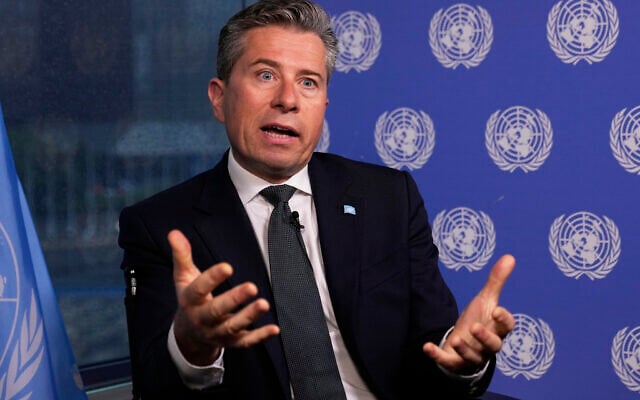 UN humanitarian chief Tom Fletcher responds to questions during an interview with The Associated Press at United Nations headquarters, May 14, 2025. (AP Photo/Richard Drew)
UN humanitarian chief Tom Fletcher responds to questions during an interview with The Associated Press at United Nations headquarters, May 14, 2025. (AP Photo/Richard Drew)However, the BBC said Wednesday that after asking the UN’s Office for the Coordination of Humanitarian Affairs for clarification, it turns out the remarks were based on an IPC report that warned that 14,100 severe cases of acute malnutrition were expected to occur between April 2025 and March 2026 among children aged between six months and five years.
This means that in fact, according to the UN report, not all of the 14,000 children are babies, they are not all expected to die, and — most notably — this is predicted to happen over the course of a full year, not 48 hours, if aid isn’t allowed into Gaza.
Pro-Israel commentators blasted the UN for the error.
Fletcher “should hand in his resignation immediately for causing a global media panic about something totally made up. He is either a complete numpty or malicious. Either way, serving Hamas’ war goals,” said Eylon Levy, a former spokesman for Israel’s government. link
IDF issues wide evacuation order to northern Gaza areas after rocket launch
Following rocket fire from the northern Gaza Strip at the southern coastal city of Ashkelon, the IDF issues a wide evacuation warning.
In a post on X, the IDF’s Arabic-language spokesman, Col. Avichay Adraee, calls for Palestinians residing in Sheikh Zayed, Salatin, Beit Lahiya, Jabalia and nearby towns to evacuate south.
He says it is a “final warning” before the IDF carries out strikes there.
One rocket was launched at Ashkelon, and it was intercepted by air defenses, according to the military. The Palestinian Islamic Jihad terror group took responsibility.
IDF says it struck suspects in south Gaza heading to collect drone flown from Israel
The IDF says it struck a number of individuals who were on their way to meet a drone being sent from Israel into the Gaza Strip.
According to the military, the IDF was tracking the drone on its journey and carried out an airstrike on suspects who were on their way to receive the drone in southern Gaza.
A similar incident occurred on Saturday.
In recent weeks, there have been several attempts to smuggle contraband into the Gaza Strip, with the IDF saying suspects on the Israeli side load up drones with weapons or drugs and fly them over the border.
PA minister claims 29 Gazans died in recent days from starvation-related causes
The West Bank-based Palestinian Authority health minister claims that 29 children and elderly people have died from starvation-related deaths in Gaza in recent days and that many thousands more are at risk.“In the last couple of days we lost 29 children,” Majed Abu Ramadan tells reporters, describing them as “starvation-related deaths.” He later clarifies that the total includes elderly people as well as children.
Asked to react to earlier debunked comments by the UN aid chief to the BBC that 14,000 babies could die within 48 hours without aid, he alleges that “the number 14,000 is very realistic, may be even underestimating [the scale].”
‘Dangerous combat zones’: IDF orders Palestinians to leave wide swaths of northern Gaza
The IDF issues a wide evacuation warning for the northern Gaza Strip, as part of its new offensive against Hamas.
In a post on X, the IDF’s Arabic-language spokesman, Col. Avichay Adraee, calls for Palestinians residing in Sheikh Zayed, Salatin, Beit Lahiya, Jabalia and nearby towns to evacuate south.
He warns that the IDF is operating “with great force” in these areas, and they are considered “dangerous combat zones.”
Palestinian reports: 3 prisoners freed in hostage deal rearrested last night, including veteran terrorist
Palestinian media reports that three Palestinian security prisoners who were freed as part of the recent hostage deal were rearrested by Israel last night.
The three are named as Mahdi Akas, Saeed Diab and Ibrahim Atiya. Atiya had served a life sentence for his involvement in a shooting terror attack in which a 7-year-old girl was murdered in 2003, as part of his membership in the Palestinian Islamic Jihad terror group.
The Palestinian Prisoners Club, a Palestinian organization representing those who are in jail in Israel, announced yesterday, prior to the arrests last night, that a total of 13 Palestinians released in the deal had been rearrested, 6 of whom remained in detention as of yesterday.
- Friend or foe? Israel risks 'self-fulfilling prophecy' in Syria, expert warnsWith US backing Syria’s new regime and al-Sharaa’s motives unclear, Israel must tread carefully militarily while boosting diplomacy, says Syria scholar; questions remain over al-Sharaa’s break from terror, impact of lifted sanctions and implications for Israel
Veterans of the American intelligence community likely rubbed their eyes in disbelief as they watched a former jihadist terrorist arrive in a suit to meet with U.S. President Donald Trump. Ahmad al-Sharaa, once designated a global terrorist known by his nom de guerre Abu Mohammed al-Golani, had been on the run for decades with a $10 million bounty on his head as the leader of Jabhat al-Nusra, an al-Qaeda affiliate.Following the fall of the Assad regime, al-Sharaa appears to be undergoing a process of "rehabilitation." With Turkish President Recep Tayyip Erdogan acting as a mediator, he has begun courting the West, culminating in a meeting with Trump during the president’s first trip to the Middle East in his current term. Still, not all is rosy. Just Tuesday, U.S. Secretary of State Marco Rubio warned that the interim government faces the risk of collapse and that Syria could descend into a new civil war.Dr. Carmit Valensi, senior researcher and head of the Syria program at the Institute for National Security Studies, discussed al-Sharaa’s background and his dramatic shift in ideology over the past two decades.She explored whether his break from terrorist groups is a recent move or part of a longer, more credible process, the current economic and social state of Syria, the implications of the sanctions relief announced by Trump and how Israel should navigate this new reality to safeguard its security interests — and potentially lay the groundwork for future normalization.'Syria is a shattered state — rebuilding could take 50 years' “Ahmad al-Sharaa was actually born in Saudi Arabia and moved to Syria at a young age. His family is originally from Syria, and some claim his father was born in the Golan Heights — hence the name al-Golani,” explains Dr. Valensi. “He didn’t start out as a jihadist or Islamist. That came later, largely in response to the 2003 U.S. invasion of Iraq. He initially joined al-Qaeda and later ISIS, but quickly realized it wasn’t for him and broke away completely by 2016. So what we’re seeing now — what some are calling a process of moderation or pragmatism — isn’t new. This isn’t a jihadist taking off his uniform and putting on a suit. It’s a long-term shift away from jihadist ideology.” On the lifting of economic sanctions on Syria, Valensi says: “The civil war has had a devastating impact on Syria’s economy. More than half the country’s basic infrastructure has been destroyed. Unemployment is extremely high, with over 90% of the population living below the poverty line. There are severe shortages of basic goods. Even in Damascus, the capital, there are only a few hours of electricity each day because of serious energy shortages. Prices are sky-high and the Syrian pound is at a historic low. “So the lifting of sanctions — something al-Sharaa and his circle pushed for from the start — is a key opportunity for economic change. These sanctions had effectively blocked all foreign investment. Now we’re already hearing about plans to rebuild infrastructure and ease financial transfers through banks, as well as a return of some international companies. Experts estimate that rebuilding Syria could take 50 years and cost between $250 billion and $3 trillion. It’s going to take time. Gulf states like Qatar, Saudi Arabia, the UAE — and especially Turkey, which is arguably the most influential player in Syria today — are expected to play a major role in this reconstruction.” Regarding how Israel should respond, Valensi notes: “Israel has taken a very militant stance. But we must understand that the longer Israel maintains a military presence in Syria, the more anti-Israel sentiment will build. Israel wasn’t a focus of the new regime, but we’re slowly becoming one. We’re also seeing a shift in Israeli policy, with early signs of dialogue — which is a positive development, because military action alone isn’t sustainable. We risk creating a self-fulfilling prophecy: we’re there militarily to prevent threats, but those threats may no longer be present. The more aggressive we appear, the more we risk inciting opposition. “There needs to be a better balance between military action and diplomatic engagement — maintaining a healthy degree of caution, but doing so in a calibrated way. This is the moment to act, while the Syrian regime remains relatively weak. There’s still leverage to secure Israeli security interests — and potentially, in the long run, even normalization. But that will take time.” link
🎗️Day 594 that 58 of our hostages in Hamas captivity🎗️
**There is nothing more important than getting them home! NOTHING!**
“I’ve never met them,But I miss them. I’ve never met them,but I think of them every second. I’ve never met them,but they are my family. BRING THEM HOME NOW!!!”
There is no victory until all of the hostages are home!אין נצחון עד שכל החטופים בבית
Red Alerts - Missile, Rocket, Drone (UAV - unmanned aerial vehicles), and Terror Attacks and Death Announcements
*7:20pm yesterday- Ashkelon-rockets from Gaza - rocket was intercepted
*9:30pm yesterday - Gaza Enveolope - rockets from Gaza - Zikim, Netiv Haasara
*3:00am - Gush Dan and Modiin areas - ballistic missile from Yemen - successfully intercepted - no reports of injuries or damages
*12:00pm- Jerusalem and Gush Dan Areas - ballistic missile from Yemen - successfully intercepted
Gaza and the South
Rubio says Syrian leaders have said they have no interest in war with Israel
US Secretary of State Marco Rubio says Syria’s new leaders “have said that they have no interest in a war with Israel.”
“They have no interest in becoming a playground to export revolution. What they want is to build a country… and that’s what we’re willing to help them do,” Rubio tells a Congressional panel, explaining the US decision to remove sanctions on Syria.
IDF says it killed 2 Hezbollah members in strikes today, including commander in elite unit
The IDF says it killed a Hezbollah commander in a drone strike in southern Lebanon earlier today.
The operative, targeted in the town of Yater, was a commander in Hezbollah’s elite Radwan force, the military says.
Earlier today, the IDF said it killed another Hezbollah operative in a strike in Lebanon.
Syrian sources say Israeli airstrikes target former army bases
Israeli jets conducted several raids on former Syrian army barracks and outposts in the southern Daraa province today in the latest string of strikes targeting the country’s military infrastructure, two Syrian security sources say.
They say at least six raids hit a base in the town of Jbab, while at least another eight strikes hit a former army base in the city of Izraa. There were no immediate reports of casualties.
‘The last ones who can talk’: Sharaa dismisses Israeli threats against Syria
Syria’s interim President Ahmed al-Sharaa rejects criticism from Israel in an interview with Reuters.
Last week Defense Minister Israel Katz called Sharaa “a jihadist terrorist of the al-Qaeda school who is committing horrifying acts against a civilian population” and earlier today Foreign Minister Gideon Sa’ar says the regime is “pure evil.”
Syrian government control is weak in Syria’s south, where Israel has taken up a presence in the demilitarized zone and threatened to target Sharaa’s forces if they deploy.
Sharaa dismisses the Israeli threats and Katz’s comments as “nonsense.”
“They are the last ones who can talk,” he says, noting the high death toll in Israel’s 17 months of war against Hamas in Gaza. link Our so-called political leaders are nothing more than petty political hacks. Instead of verbally attacking the new Syrian government, whose leader Al-Sharaa has made multiple overtures towards peace with their neighbors, they should be deep in back channel secret talks with the new regime to begin forming a new relationship and 180 degree change in the dynamics of our close neighborhood. It was made public that certain talks have started through a 3rd party but they were only focused on military issues and not on diplomatic changes. This failed government has no strategy, no view of what a new Middle East could and should look like. They only act tactically with no idea of what comes next. They are not capable of leading our country into a new period of positive change. They are stuck in the past and tied to their corrupt ideologies.
Settlers said to torch a car, try to set fire to mosque in West Bank village
Palestinian media reports that settlers have attempted to set fire to a mosque and torched a vehicle in the village of Aqraba in the northern West Bank.
There are no casualties.
Footage shows the vehicle being set on fire, signs of arson at the entrance to the mosque, and Hebrew graffiti sprayed on the mosque’s outer walls reading, “The nation of Israel lives,” and “Jewish blood is not worthless.”
The police have not yet issued a response. video
Police readying for tensions ahead of annual Jerusalem Day Flag March on Monday
Police are bracing for friction ahead of the annual Jerusalem Day Flag March slated for Monday, which will see thousands of national religious Israelis parade through the Old City’s Muslim Quarter toward the Western Wall.
Thousands of officers and border cops will be deployed in Jerusalem on the holiday, which marks the reunification of the city in the wake of the Six Day War.
The parade will take its usual route, beginning at the Jerusalem Great Synagogue, continuing into the Old City via Damascus Gate, and ending at the Western Wall.
To make way for marchers, police will close several roads to traffic, including the main thoroughfare between West and East Jerusalem.
Extremist Jewish youth attending the Flag March have been known to harass and beat Palestinians during the procession, especially as it enters the Old City through Damascus Gate.
Last year’s march saw several attacks on Palestinians and journalists by marchers, who chanted anti-Arab refrains and plastered stickers on shuttered shops supporting the ideology of the late ultranationalist Rabbi Meir Kahane and calling for the expulsion of Palestinians from the Gaza Strip. Officers arrested 18 suspects for violent offenses over the course of the day.
Police say they will “work to prevent all forms of violence or provocation,” in a statement this afternoon. They further call on participants and the wider public to “refrain from physical or verbal violence, and allow the event to proceed peacefully and lawfully.” link Netanyahu's successive governments have set out to limit the Palestinian power in Jerusalem, promote Jews moving into Arab sections of Jerulasalem and reaffirming Israel's right and stronghold on Jerusalem. Jerusalem Day is exactly for the purpose of showing all of Arab that we Jews hold the power over them and over Jerusalem, and that they are living in Jerusalem only by our grace.
But all of this is nothing more than racist settlement shows. Jerusalem is very much a divided city. There are hardly any Jews who have been or be willing to enter any one of the 22 Palestinian villages that make up the municipality of Jerusalem. Most Jews cannot even name more than one or two of those same villages. And Jerusalem Palestinian arabs entering Jewish areas of Jerusalem are immediately suspect and can be stopped or beaten by police, border police and the extremist groups that deliberately hang out in areas that they know young arabs can be found. For a supposedly united city, it is more divided than ever and days of Nationistic chauvinism only deepens the divides.- End the war to get back the hostages. Save Israel -Op-ed: Day 593 of the war by David Horovitz- Editor in Chief of The times of Israel
Netanyahu knows his coalition will collapse if he revives the kind of agreement he and his ministers accepted in January. That should not, and need not, faze himLet’s deal with this right away. Contrary to Yair Golan’s incendiary assertion, Israel is not “killing babies in Gaza for a hobby.”
I don’t believe Golan, the former deputy IDF chief of staff and October 7 war hero who now helms what used to be the Labor Party, thinks Israel is doing so either. Twice in the hours after he made the remark in the course of an impassioned Tuesday morning radio interview, he attempted to walk it back without acknowledging he’d gone overboard — first by saying he had been aiming his criticism of the war at the government rather than the IDF and its soldiers, and then, in a televised address, tying himself in semantic knots when attempting in vain to reframe what he had said.
What Israel under Prime Minister Benjamin Netanyahu is doing in Gaza, however, is fighting an intensifying war that, while avowedly and legitimately aimed at destroying Hamas and freeing the 58 hostages still held there 19 months after Hamas’s invasion and massacre, is reducing Gaza to rubble, causing growing numbers of Gaza civilian fatalities young and old, costing more Israeli soldiers’ lives, and endangering the hostages.
It is expanding the military campaign while telling the Israeli and global public less and less about the specifics of its operations.
It is ignoring the consistent will of two-thirds-plus of the Israeli public to secure the release of the hostages even at the price of ending the war — to return, essentially, to the deal that Netanyahu and his cabinet unanimously approved in January but chose not to pursue after the first of the three envisaged phases had been implemented.
It is also, as Golan was correct in saying, turning Israel into a “pariah state.”
Directly addressing Palestinian civilians in Gaza on Tuesday, IDF Chief of Staff Eyal Zamir pointed out: “We are not the ones who brought this destruction upon you. We did not start the war. We did not rob you of food, shelter, or money. We are not the ones hiding in hospitals or schools. We are not the ones staying in luxury hotels while you live in hardship. This is your leadership, those who are holding our hostages. Hamas is responsible for starting the war. It is responsible for the dire situation of the population. It destroyed, and it will not be the one to rebuild.”
True. All true.
But as things stand, the government is, by its own hand, destroying what little international support remains for its efforts, with Netanyahu declaring that Israel is going to “take over all of Gaza” and acknowledging (Hebrew link) that the Gaza civilian populace is nearing the brink of starvation, after 11 weeks in which Israel halted supplies. He has accurately explained that Hamas has been commandeering aid and profiting from it, but he has failed to expeditiously introduce a long-discussed viable alternative supply mechanism.
The government is itself discrediting those legitimate goals of the war — the obligation to get back the hostages and make sure Hamas cannot rise again to slaughter Israelis — with relentless unconscionable ministerial and official declarations that the wider goals of the military offensive include destroying all of Gaza, cleaning it out, forcing the entire populace into a narrow area at the southern foot of the Strip, creating conditions in which Gazans will leave in large numbers for unspecified third countries, retaining the territory, and reviving Jewish settlement there.
Hamas abducted 251 hostages with the clear-eyed, cynical intention of using them as leverage to ensure that it would survive Israel’s military response to its massacre of 1,200 people in southern Israel on October 7, 2023. It will not easily give up the last of them, and it will not easily relinquish its control of Gaza and slink away into exile, whatever it might profess readiness to do in any negotiated agreement.
And that is precisely why more than two-thirds of the Israeli public have been pleading with their government to accept a deal that will ostensibly bring the return of the hostages in return for an end to the war and, yes, the release of many more murderous terrorists:
Because Hamas can be relied upon to break any commitment it may make. And thus Israel, sooner rather than later, will need to resume its military campaign. But in the meantime it can secure the release of many, perhaps even most of the hostages, before more of the living captives are dead.
Because fighting on, with a growing death toll of Gazans, soldiers and hostages, and with deplorable aims set out by the likes of Finance Minister Bezalel Smotrich, is both tearing at the moral fabric of our society and destroying Israel’s international legitimacy, thereby playing directly into Hamas’s hands.
Britain’s Foreign Secretary David Lammy on Tuesday delivered a blisteringly furious speech in Parliament in which he suspended UK-Israel trade talks and threatened further punitive measures: “Netanyahu’s government is planning to drive Gazans from their homes into a corner of the Strip to the south and permit them a fraction of the aid that they need,” he noted. “Yesterday, Minister Smotrich even spoke of Israeli forces ‘cleansing’ Gaza, ‘destroying what’s left,’ of resident Palestinians ‘being relocated to third countries.’ We must call this what it is. It is extremism. It is dangerous. It is repellent. It is monstrous.”
The UK’s stance leaves the Trump administration as the only relatively supportive major ally Israel now has as regards the Gaza war. And, indeed, it was President Donald Trump himself who first raised the idea of the morally untenable and unworkable forced evacuation of all Gazans and the leveling of the Strip. But Trump has since wobbled on that idea, latterly insisting that he would not be seeking to expel anybody, and, last week, warning that “there’s a lot of bad things going on” in Gaza: “We have to help also out the Palestinians. You know, a lot of people are starving in Gaza, so we have to look at both sides.”
Netanyahu consistently denies that coalition politics are driving his policies on the war. But the arithmetic is simple: If he stops the war, Smotrich and Itamar Ben Gvir take their far-right parties out of the coalition, and he loses his majority.
Okay, but so what?
Israel’s existential security interests, its global alliances and its internal cohesion are at stake. But if that’s not enough, the prime minister can reasonably bet on himself to politically survive a deal to bring back the hostages in return for ending the campaign.
He would be able to present it as the vindication of 19 months of military and diplomatic pressure. Domestically, he would be able to insist that he was always doing his utmost to secure the hostages’ freedom. He would be able to depict Hamas as a radically reduced threat, and to highlight his intention to strike at it whenever and wherever it tries to raise its head. For a little while, at least, the killing would halt. Reservists could go back to their families and their jobs. The economy could revive.
He would be able to work with potential regional partners on a non-Hamas postwar Gaza. The path would reopen to wider regional normalization. Britain and other horrified allies would be reconciled. Trump would be delighted.
He’d pull Israel back from the abyss.
So, yes, his coalition would collapse. But he might just free the hostages, halt the deaths for a while, win back the Israeli public and some of the international community… and probably win reelection. link
Yair Golan says the government’s rhetoric, not his, fuels antisemitism and attacks on Jews
The Democrats party chief Yair Golan sends condolences to the families of the victims of the US shooting attack that killed two Israeli Embassy workers.
Responding to a far-right minister’s claim that his rhetoric is to blame for the attack, the left-wing leader counters that the discourse of government ministers, including supporters of racist rabbi Meir Kahane, enabled it.
“The government of Kahane Chai” — referring to Kahane’s Kach party that was outlawed in the 1980s — “is the one that fuels antisemitism and hatred of Israel, and the result is unprecedented diplomatic isolation and danger to every Jew at every point on the globe,” Golan asserts.
He vows to replace the government and “restore security to all Jews, in Israel and anywhere around the world.”
The Region and the WorldSyrian government signs breakthrough deal with Kurdish authorities in northeast
Syria’s central government reaches a deal with the Kurdish-led authority that controls the country’s northeast, including a ceasefire and the merging of the main US-backed force there into the Syrian army.
The deal was signed today by interim President Ahmad al-Sharaa and Mazloum Abdi, the commander of the US-backed, Kurdish-led Syrian Democratic Forces.
The deal marks a major breakthrough that would bring most of Syria under the control of the government run by the group that led the ousting of president Bashar Assad in December.
The deal to be implemented by the end of the year would bring all border crossings with Iraq and Turkey in the northeast, airports, and oil fields under the control of the central government.
Syria’s Kurds will gain their rights, including teaching and using their language, which were banned for decades under Assad
- Personal Stories
Acronyms and Glossary
ICC - International Criminal Court in the Hague
IJC - International Court of Justice in the Hague
MDA - Magen David Adom - Israel Ambulance Corp
PA - Palestinian Authority - President Mahmud Abbas, aka Abu Mazen
PMO- Prime Minister's Office
UAV - Unmanned Aerial vehicle, Drone. Could be used for surveillance and reconnaissance, or be weaponized with missiles or contain explosives for 'suicide' explosion mission
Join my Whatsapp update group https://chat.whatsapp.com/IQ3OtwE6ydxBeBAxWNziB0
Twitter - @LonnyB58 Bluesky - @lonny-b.bsky.social
Twitter - @LonnyB58




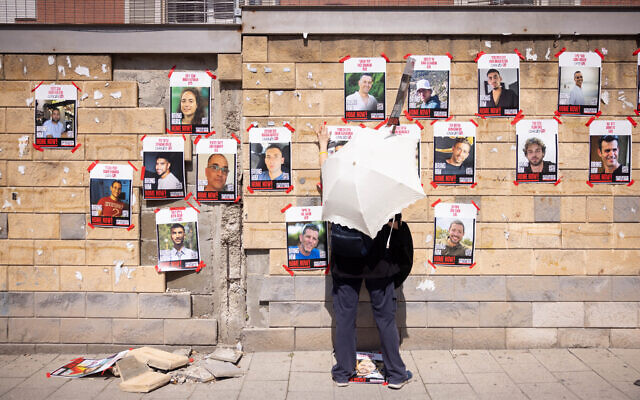


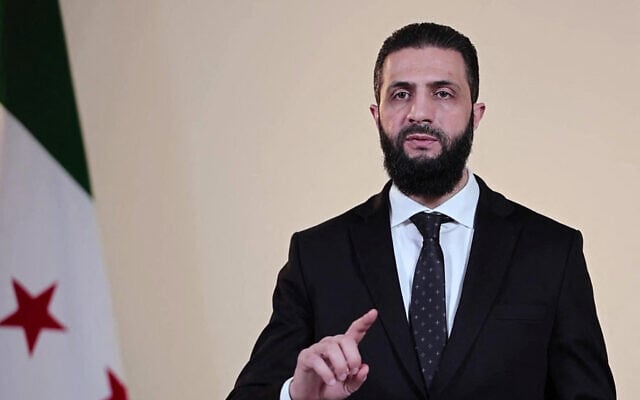


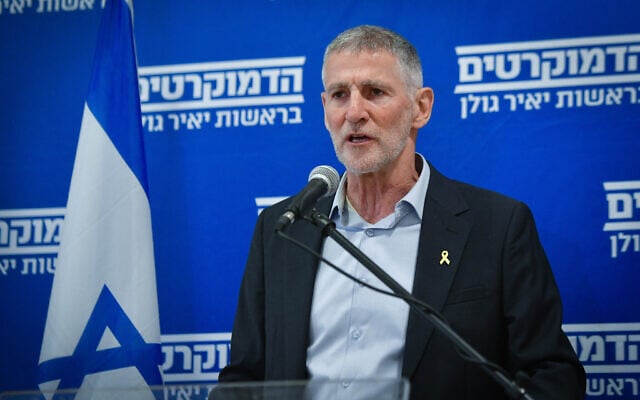



Comments
Post a Comment